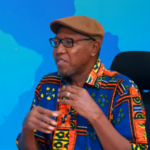The Minister of Local Government, Decentralization and Rural Development, Dan Botwe says communities affected by the spillage of Akosombo Dam need to be resettled to avoid future devastation.
The Minister highlighted the impact of climate change, particularly evident in the recent Akosombo Dam Spillage disaster and stressed the need for resettlement, drawing parallels with actions taken during the dam’s initial construction.
He said this in a speech read on his behalf by Martin Adjei Mensah Korsah, his Deputy during the 52nd Annual General Conference of the Ghana Institute of Planning (GIP) in Koforidua.
The Minister called on members of the association to collaborate with various stakeholders for a sustainable resettlement plan.
“Our commitment to sustainable development goals underscores our dedication to leaving no one behind and ensuring that our progress is inclusive and equitable, sustainable, safeguard our natural resources, conserve biodiversity and mitigate the effect of climate change. An example is the effect of climate change pushing water levels beyond operating capacity of Akosombo Dam resulting in the spillage and consequences of settlement along the Volta River. This effect calls for the resettlement just as occurred during the construction of the Dam. Executive, members and all stakeholders will need to play their collaborative role in addressing such effects,” The Minister said.
He emphasized ongoing reviews of the National Urban Policy and Land Use and Spatial Planning Act.
These reviews aim to enhance smart, economically sustained planning across the country.
While the Inter-Ministerial Committee is yet to decide on the fate of the victims, the Ghana Institute of Planning (GIP), a professional body of engineering planners, is eager to contribute to the planning process.
GIP expressed its commitment to collaborate with the Inter-Ministerial Committee overseeing the Akosombo Dam Spillage flood devastation.
The Institute said it is prepared to assist in either reconstruction or resettlement, emphasizing the importance of a sustainable approach.
President of GIP, Pln. Mohammed Damba, stressed the need for comprehensive re-engineering planning, extending from upstream to downstream, to ensure a sustainable solution for these affected communities.
Mohammed Damba pointed to the GIP’s track record of effectiveness, citing their involvement in planning a sustainable reconstruction settlement after the Apiatse explosion disaster, with the first phase of that project nearing completion.
Concluding the conference, 202 new members and fellows were inducted into the Institute. Additionally, new national executives were elected, with Pln. Percy Anaab Bukari chosen as the new President.
Source: Ghana/Starrfm.com.gh/103.5FM/Kojo Ansah




